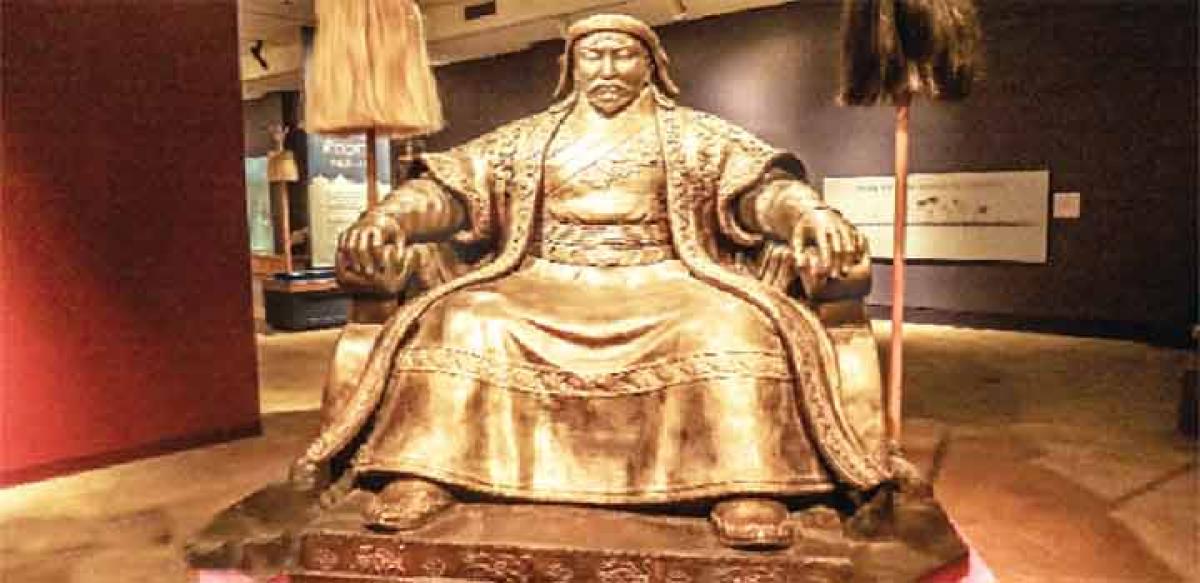Live
- Aaditya Thackeray Calls For EOW Probe Into Mumbai's Rs 7,000 Crore Road Project
- Omar Abdullah Urges Congress To Earn INDIA Bloc Leadership Role
- Yogi Adityanath Contrasts Historical And Modern Treatment Of Workers In India
- Historic Temple In Sambhal Reopens After 46-Year Closure Following 1978 Riots
- Officials directed to work for deeper reach of guarantees
- Delay In 'One Nation, One Election' Bills Introduction Announced
- Exhilarating ‘Benchmark’ of Venkat Changavalli
- Development activities worth `30 cr launched in Puthalapattu constituency
- Allegations against KTR baseless: BRS leader
- Megastar Chiranjeevi to Visit Allu Arjun’s Residence at 12 PM Today
Just In

While the cruelty, pillage and plunder of Genghis Khan has been emphasised by many historians including Voltaire, there are many key aspects of the \"Genghis Khan Way\" that have probably not been emphasised. They are:
.jpg)
While the cruelty, pillage and plunder of Genghis Khan has been emphasised by many historians including Voltaire, there are many key aspects of the "Genghis Khan Way" that have probably not been emphasised. They are:
He promoted people in his tribes based on merit, loyalty and achievement - and not based on birth.
He lowered taxes for everyone and abolished them for doctors, teachers, priests and educational institutions.
He established a regular census and an international postal system.
He created an international law and recognised the ultimate supreme law of the Eternal Blue Sky over all people. He granted religious freedom to all but demanded total loyalty from conquered subjects of all religions.
He created a free-trade zone across the continent and ensured safe passage by eliminating bandits and pirates.
He instituted the novel practice of granting diplomatic immunity for all ambassadors and envoys, including hostile nations.
While at war, there was no scope for negotiations on an order. But the decision to go to war as well as many other key decisions were taken via a (relatively) democratic process called the "khuriltai" (council) that included folks from the various tribes/clans.
He ensured that the "loot" from any city they captured was shared systematically - and that the families of the fallen soldiers got a fair share. This inspired loyalty.
He embraced local technology and expertise. By combining the gunpowder, casting technology and the rocket, he created the modern cannon. Early enemies thought the Khan had brought fire-breathing dragons along with him.
His team travelled light, fast and lived off the land. They also used whatever they found to create the equipment they needed to fight.
For this, they led with an Engineering corp that could innovate based on what is available. For this reason, most rulers who fought him expected his army to show up a week or two after the day when they suddenly showed up!
11. His last ruling descendant, Alim Khan, emir of Bukhara, remained in power in Uzbekistan till 1920. Genghis Khan ruled from 1206 to 1227 AD. For 700 years, his dynasty ruled some part of the world.
And he did this without inventing any new technology. Just by his ability to organise people - at war and during peaceful times. And you do not see any monument built by him because his tribe lived in "gers" - tents with an inner structure and covered with felt cloth.
And wherever he went, he focused on getting the "loot" as well as the expertise. Not building monuments that would reduce his ability to move quickly.
The Genghis Khan Way
1.Be fast and focused.
2. Don't build structures that hinder rapid movement.
3.Promote based on merit. Not on privilege or birth.
4.Don't always attack. Retreat as a strategy makes the enemy overconfident and lower their guard.
5.Use the element of surprise. Try something never done before.
6.Unite warring factions. Make people work as a team. Create a network of small teams.
7.Demand absolute loyalty to the cause. Be ruthless with folks who are not.
8.Let individual beliefs prosper as long as loyalty to the cause is assured.
9.Seek out folks who are experts in their field and get them to solve your problems.
10.You don't have to invent a new technology to win. Seek out existing technologies and synthesize them for your goals.
11. Be generous with your team. Take care of their families.

© 2024 Hyderabad Media House Limited/The Hans India. All rights reserved. Powered by hocalwire.com







